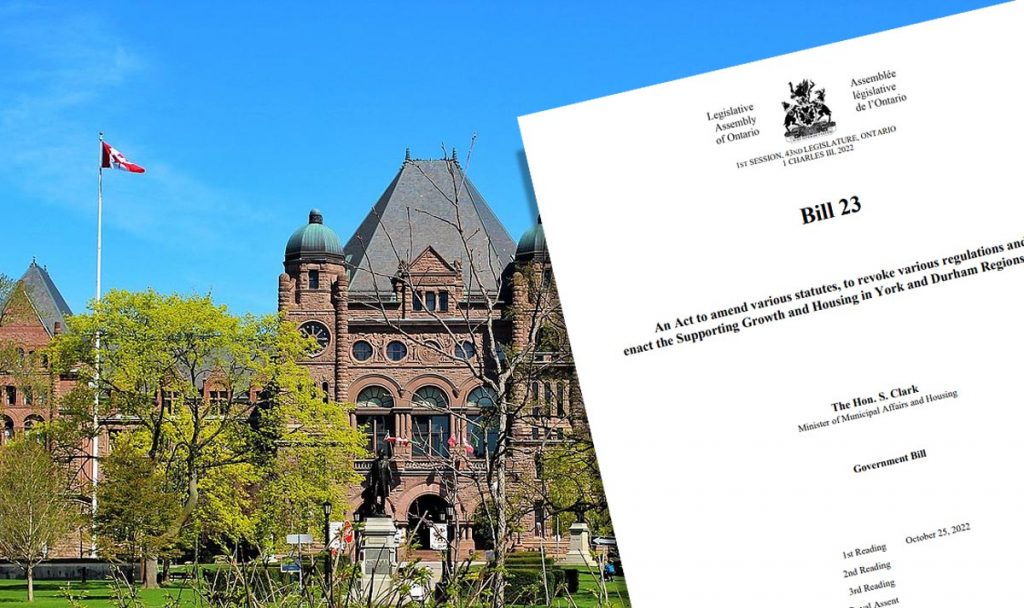
When Premier Ford decided to drop Bill 23 aka “More Homes Built Faster Act” on October 25th, a day after the municipal election, planning staff in many municipalities scrambled to analyze what this bill would mean. We know it will line the pockets of Ford’s developer friends, but how will it impact municipalities… and ultimately the taxpayers that fund them.
The Planning Staff in Ottawa scoured over the document and looked at what the changes would mean for the City and prepared a report for the consideration of their Council. Their findings paint a grim picture of the local impacts that the Bill will have upon their city, and by extension, other municipalities.
The memo to Ottawa Council from Don Herweyer, head of Ottawa’s Planning & Economic Development department outlines that City Staff are still working on the previous changes initiated by Ford in Bill 109 aka “More Homes For Everyone Act“. Many of the “initiatives” in that Bill have an implementation deadline of January 1, 2023. He further stated on Bill 23 that:
“If passed as proposed, in combination with Bill 109 these changes would have significant impacts on municipal financing, processes and operational matters across multiple business units.”
The report (included below) includes a litany of changes that Bill 23, if passed, would impose on local planning, some of which we have mentioned in our previous post. But what does these mean for Ottawa, and presumably other municipalities?
Ottawa staff see Bill 23 as narrowing the focus on housing to “quantity” and “diminishes the critical role municipalities play in providing for quality and support for growth”. They viewed this as a potential for creating an imbalance in the City, in amenities, services and infrastructure needed for long-term success. They also see the gaps in funding that Bill 23 would result in situation where:
“[…] growth will not pay for growth, and the burden of supporting infrastructure necessitated by growth could be significantly delayed, levels of service degraded, and/or the costs passed on to existing municipal rate payers.”
So while Ford’s developer pals enrich themselves with “increasing the housing supply”, all of us get to shoulder the burden. As an aside, there has been no substantive evidence put forward by the Province or the Homebuilder Cartels Associations that increasing the housing supply would actually bring down the retail cost of housing.
Among other concerns from Ottawa’s Planning Staff:
- Development Charges (DC) and Parkland changes may lead to housing delays, and will reduce the ability to support growth.
- Parkland dedication changes will result in reduced livability.
- Environmental and rural policy changes may lead to more sprawl and increased loss of biodiversity.
- Removal of exterior design review from Site Plan will not lead to better design, or more livable and attractive cities.
- Removal of sustainable design review from Site Plan could erode the achievement of local greenhouse gas emissions targets.
- Changes to the Heritage Register could create more uncertainty and delays.
On Parkland Dedication in the Planning Act:
“Lowering the upper limit of what the City can ask for in its Park Dedication By-law compromises livability, health and safety of intensified areas. Acquiring that land or developing facilities through taxes will result in an additional financial burden for municipal rate payers.”
On changes to the Development Charges Act:
“A funding gap already exists for growth-related costs. The City cannot afford to subsidize development on the backs of its rate payers.”
And:
“Exempting “gentle intensification” units from development charges significantly hinders the City’s ability to fund infrastructure renewal and ensure that parks, community facilities and local infrastructure keep pace with increasing pressures from new demand, particularly in existing neighbourhoods. It compromises the City’s ability to keep water and sewer systems in a state of good repair, despite the added pressure to the systems directly from the new units.”
On “gentle intensification” (up to 3 units per lot):
“New “gentle intensification” permissions could result in increased pressure for on-site parking, on street parking, driveway widenings, front yard parking, and removal of trees in front and rear yards to provide parking areas, impacting the urban forest canopy and permeable surface area.”
Changes to Site Plan Control would:
“Impact the City’s ability to create desirable streetscapes, attractive spaces and promote sustainable development. This will compromise our climate change mitigation efforts and impair our ability to deliver a livable, resilient and attractive City in line with the provincial interests.”
On changes to the Ontario Heritage Act, staff would be overworked in justifying properties on the Municipal Heritage Register and have to be “reactionary” where a property may suddenly face demolition. Thus the report states:
“Changes to the register listing process may result in more properties being designated under Part IV of the Act and more Heritage Conservation Districts designated under Part V of the Act, as tools to conserve important properties and areas.”
And:
“There will be a greater burden on the Built Heritage Sub-Committee and staff to hold special meetings to meet statutory timelines or to consider reactive designations where the alternative is demolition.”
The above is just a sampling of what Ottawa staff sees as being major hurdles not only for the City, but for residents. A full-read of the documents attached below is recommended.
In simple terms, more housing via the mechanisms as proposed in Bill 23 will cost all of us financially, environmentally and have a high probability of affecting the quality of living that the current municipal planning framework delivers.
Better Call Saul Sam
If you think that the Province is moving in the wrong direction with Bill 23 (and proposed Greenbelt changes), our local MPP and Doug Ford’s party-mate, Sam Oosterhoff would be glad to hear your opinions on the matter. You can contact him at the following:
Email: sam.oosterhoffco@pc.ola.org
Telephone: 905-563-1755
Here is the full memo and Appendix from the City of Ottawa:
606128874-Memo-to-Council-City-Comments-on-Bill-23-2You can download the Memo by clicking here.
606128871-BLEWETT-Appendix-a-Comments-on-Impact-of-Proposed-Changes-2You can download the Appendix by clicking here.